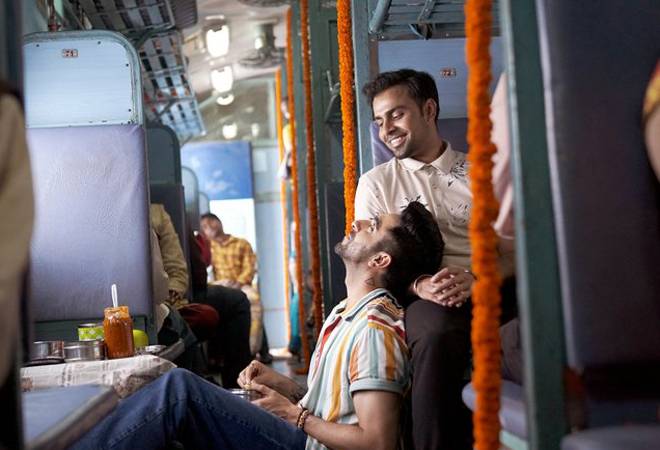
From an urban man who boldly explores his sexuality to an alpha male whose orientation is one big secret – here’s how some Bollywood characters belonging to the LGBTQ characters in the recent past has left an impact, with their stellar performances in authentic stories of pride!
Karan Mehra in Made in Heaven: Amazon Prime Video’s Made in Heaven, which released in 2019, stood out for its authentic portrayal of life, love and everything in between. The show revolved around two wedding planners in Delhi – one of them being Karan Mehra (played by actor Arjun Mathur with finesse, which also got him an Emmy nomination!). Here, Mehra is seen depicting an urban, modern and open-minded gay man. He is a career-oriented 20-something man who lives life on his own terms. There is not a single thing about him that screams of ‘cliché’ or is symbolic to his sexuality. And that’s exactly what makes his character believable. His sexuality is not what describes him, rather it’s shown as a part of him – as with a heterosexual man or woman. But how he battles against all odds to retain his normal life in a society which deemed homosexuality as crime is what defines him. It was the first time a homosexual character was made with flesh, blood and emotions – and not just another ‘prop’ or propaganda character. And it goes without saying that Mathur has infused life to Karan Mehra – that will always be remembered as one of the best queer characters of all time!
Bharti Mandal in Ajeeb Daastaans: Konkona Sen Sharma gives yet another stellar performance in this Netflix anthology. Sharma, in her short ‘Geeli Puchi’ starring opposite Aditi Rao Hydari, plays Bharti — a Dalit lesbian. Being a woman, a Dalit and a queer in a society like ours makes living challenging in more ways than one. But despite all such odds, Bharti forges ahead in life and is comfortable of her sexuality. We also see Hydari as Priya, a contrast to Bharti. The former being an upper caste, and in a privileged position – but has not accepted her sexuality yet and is suppressed by patriarchal norms. This, somewhere, makes Bharti a strong-willed and bold outcast. This tale of revenge is thus led by her, where she fights for her own happy ending.
Ayesha Agarwal in Bombay Begums: This Netflix series was all about women. How it handled taboo topics like sexual assault at workplace, misogyny, menopause, among others. Women’s sexuality was also an integral part of the show. Here, a 20-something woman Ayesha Agarwal (Plabita Borthakur) who, like many, comes to Mumbai to live an independent life and follow her dreams. How she navigates through life’s ups and downs while coming to terms with her sexuality is how her story unfolds. The way her bisexuality comes into the forefront, and how she accepts it and acts upon it has been depicted with utmost perfection.
Aman Tripathi in Shubh Mangal Zyada Savdhaan: In this queer comedy drama starring Ayushmann Khurrana, which released at the onset of 2020, we see Amit Tripathi (Jitendra Kumar) hailing from a conservative middle-class family in Allahabad. Tripathi is just a regular guy with a regular job – and his sexuality is not used as badge of honour, nor a distinguishable trait. It’s just who he is, and who he chooses to love, because after all love is love. But that’s something his orthodox family doesn’t approve of (initially!) and instead detests and views as a “sickness.” But how this so-called common man fights for his uncommon love story – even the small baby steps, be it “the talk” with parents or openly showing his affection to his lover – is what forms the integral part of the film. This film also marked the first one where an A-lister (Khurrana) was seen portraying a queer character in a mainstream Bollywood film.
Babloo in Ajeeb Daastaans: (*spoilers ahead) In this Netflix anthology, the story ‘Majnu’ depicts a loveless marriage between Babloo and his wife Lipakshi. How the entrance of a young, educated and charismatic young man Raj changes the lives of both the husband and wife is what the story is about. Here, the talented Jaideep Ahalwat depicts the role of Babloo. He is seen as the typical “macho” alpha male, and at first glance (and even as the film progresses) it’s hard to imagine this orthodox man falling in head over heels – that too for a man! But that’s exactly how this story breaks the age-old regressive mindset on how a gay man should be effeminate, and never macho or alpha. This is why it stands out, and creates an impact.
(Cover: Ayushmann Khurrana and Jitendra Kumar in a still from Shubh Mangal Zyada Saavdhan)
Delhi hosted what organisers describe as the world’s first player auction in golf, launching ‘72…
An elderly woman recalls how her six-year-old granddaughter lay bleeding after a speeding car hit…
Municipal Corporation of Delhi plans a unified policy enabling RWAs to adopt and maintain parks…
A 17-year-old boy allegedly died by suicide after jumping before a moving train at Uttam…
Delhi High Court grants bail to 26-year-old Thar driver accused of mowing down two in…
Two Rohini men arrested for fatally stabbing one person and injuring another during a robbery…